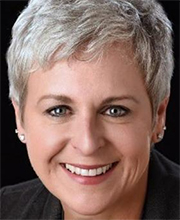
Editor’s Note: In September 2020, Rotary formed a task force charged with assessing the current status of diversity, equity, and inclusion (DEI) in Rotary and shaping a comprehensive action plan to help us further value and live those principles throughout the organization. This is the second in a series of blog posts from DEI Task Force members reflecting on their work on the committee and why it is critical for the organization.
Valarie Wafer, task force chair, is 2021-22 Rotary International vice president, and a member of the Rotary Club of Collingwood-South Georgian Bay, Ontario, Canada. She has served as an RI training leader, 2018 Toronto Convention Host Organization Committee member, assistant regional Rotary Foundation coordinator, and RI president’s representative. (Read her full bio).
Q. The business you own (a Tim Horton’s franchise) has been recognized for its inclusive hiring practices. You’ve had first-hand insight into how businesses/organizations develop a competitive advantage when they prioritize inclusion. What long-term benefits can an organization like Rotary derive from making DEI even more a part of our culture and approach to operating?
Valarie: Our operation was recognized for hiring people with disabilities of all types in every position from front line to management. We built a culture of inclusion by having an intentional and committed conversation with each employee to ensure that they had the tools they needed to succeed. Our customers told us that they came out of their way to do business with us because we represented the community.
I quite often make the comparison between Rotary and a franchise operation. Each franchise operates in a community and while the main product offerings at each of those locations comply with the corporate brand, they are nuanced to the demographics. And this is really true of Rotary clubs. We have a strong recognizable brand, but our culture and our Rotary experience can be different even in a club across town. Representing your community is good for business, and it’s good for our Rotary clubs because when you walk through the door and feel like you can be yourself and feel valued, you’re more likely to stay.
Q: What are some characteristics that organizations with a strong, enduring DEI culture have in common? And what can Rotary learn from those organizations?
Valarie: I think this comes down to attraction, retention, and engagement, which ultimately leads to profit in organizations. More important than your policies are your practices, and your intentional committed leadership. Don’t just say it but do it. A DEI culture is one where there is safety to make mistakes, take chances on big ideas, and not be punished for it – which leads to greater innovation. A company known for this kind of culture is more likely to attract and keep talent.
Attraction, retention, and engagement are top priorities for Rotary. The Board’s 2019 DEI statement was intentional and reflected the input of Rotary members. We’re hearing from Rotarians and Rotaractors around the world that they want to see Rotary not only talk about DEI, but also take meaningful action. And so the task force was formed to create an ongoing plan to drive meaningful action and measurable change.
It’s exciting to see our clubs and districts take the lead in creating DEI committees to educate their members and connect with those currently not represented from their community. We know this is an ongoing journey and we need to listen to our members.
Q: Part of the message coming out from the board and our leadership is that Rotary doesn’t consider issues of diversity, equity, and inclusion to be political in nature. What do we mean by that?
Valarie: Politics do not play a role in human rights. It doesn’t belong to any particular party or government. History, bias, stereotyping, and hatred do not belong to any one generation, but we can all help dismantle it. Education and conversation are key. And Rotary’s core values and The Four-Way Test can help guide our intentions.
Q: With our organization being in as many countries and cultures as it is, Rotary is geographically/culturally diverse. Why is it also important for Rotary to address creating an inclusive experience?
Valarie: Diversity alone isn’t enough to consider an organization inclusive. All are not necessarily welcomed or given the space to be themselves and bring their unique perspectives and backgrounds to the table in all clubs. The RI Board recently approved the recommendation of the task force to expand upon our earlier DEI statement. I think this action encapsulates our intention to look internally and externally. We renewed our commitment to the 2019 statement, and we expanded it to recognize that historically some members have experienced barriers, and we want to ensure our partners advance equity as well as we want to celebrate uniqueness. The honesty expressed in the statement – that we will be transparent and continue to learn and do better – speaks to this being a journey that we are committed to as leaders.
Q: How can Rotary clubs provide that inclusive environment in communities across the world?
Valarie: We recognize the focus of diversity is different in Africa than it is in India, than it is in Europe, or North America. And this is one of the reasons why the task force engaged an external consulting firm as partner to launch our DEI survey, focus groups, and leadership interviews. It was important for us to understand who we are today so that we could have measurable outcomes going forward. The task force will now explore some key overarching themes as opportunities to develop policy, training, and education, as well as support to the communities around the world to be able to provide that inclusive environment. We have work ahead of us to do, and we need to support and listen to all our members.
Learn more about Rotary’s Diversity, Equity, and Inclusion statement and meet other members of the task force.
https://blog.rotary.org/2021/08/20/conversations-with-rotarys-dei-task-force/

